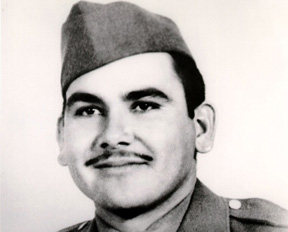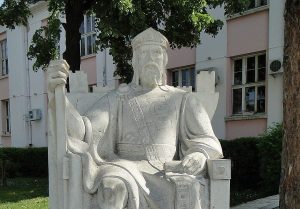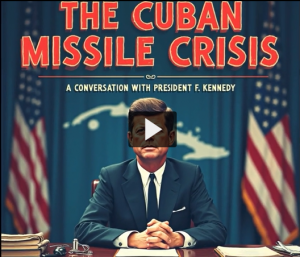
Private Felix E. Longoria from Three Rivers, Texas, was one of the soldiers who gave his life during World War II. Felix Longoria was drafted into the U.S. Army in 1944, and completed six weeks of basic training in Fort Ord, California with the 27th Infantry Regiment of the 25th Infantry Division. He was deployed to Luzon Island for his first combat assignment as an infantry man. He soon volunteered to join a patrol with orders to dislodge enemy snipers. Army Private Longoria was killed in 1945 at the age of 25 by a Japanese sniper and was awarded a Bronze Service Star, a Good Conduct Medal and a Combat Infantryman’s Badge.1 His remains were not recovered and identified until 1949 when they were returned to Three Rivers, Texas, his hometown.2
World War II, a global war, lasted from 1939 to 1945 and was the deadliest conflict in human history. The National WWII Museum reports over 500,000 Latinos (including 350,000 Mexican Americans and 53,000 Puerto Ricans) served in WWII. However, exact numbers are difficult to calculate because except for the 65th Infantry Regiment from Puerto Rico, Latinos were not segregated into their own units the way African Americans were.3 This article is not about World War II itself, instead it tells the story of one of our own Mexican American World War II Heroes from Texas. This affair shows how his community discriminated against him and his family after the war had ended despite his heroic military service for the US.
Three Rivers, Texas is a small town between Corpus Christi and San Antonio known for its hunting and fishing. In the early 1900’s, the main industries were a glass factory and a natural gas refinery. As most towns in the deep South, Three Rivers was ripe with racial segregation and discrimination. In South Texas in the 1940’s, Mexican Americans were treated as second class citizens despite many having their U.S. Citizenship. All were called Mexicans, they were turned away from local shops, swimming pools, and even banned from the barbershops. Signs were posted declaring, “No dogs, no blacks or Mexicans allowed” and “We serve whites only, no Spanish or Mexicans.”4 It was still a time when many Mexican women could only work as cleaning ladies, for Anglo families, sometimes getting paid as little as 15 cents for a day’s work. Mexicans were considered non-white despite being counted as whites on the census.5 World War II caused the nation to reexamine the laws. The Texas Legislator’s 1943 “Caucasian Race Resolution” granting Latin Americans status as “white” citizens notwithstanding.6 Thousands of Latino-American veterans returned from the war to find they were still second class citizens at home. The town of Three Rivers was no exception, Mexican Americans still lived on one side of the railroad tracks with Spanish street names and whites on the nicer side of the tracks.
Small towns were usually quick to acknowledge the death of American Heroes but not for Private Longoria’s. In mourning the death of her husband, Beatrice Longoria was to make arrangements for the wake service that she wanted to hold in their hometown. When she spoke to the Rice Funeral home, the only funeral home in town, the director, Tom Kennedy, declined to plan the service because he explained Felix Longoria was “Mexican” and because “the whites would not like it.”7 Mr. Kennedy was willing to set up a wake at the Longoria home as was the customary treatment of Mexican Americans by the Three Rivers community. Kennedy at one time was in the military, where he fought in Europe, suffered shrapnel wounds and was hospitalized until he went back to the United States. Therefore, it came as a surprise that Kennedy had no compassion for his fallen brother at arms.

Though Felix Longoria’s father had purchased a family plot on the Westside of the town where there was a fence that separated the Mexicans from the all-white burial plots, it was the service for the wake where the outrage began. All Beatrice Longoria wanted was for her husband’s service to be in his hometown with family and friends. Mr. Kennedy angered the Mexican-American community by not allowing the wake to be held at the funeral home. How was it that his ethnicity rather than his ultimate sacrifice for the country mattered more in determining whether he would received a proper burial with full honors. Hurt, confused, and in mourning, Beatrice’s sister Sarah Posas contacted Dr. Hector P. Garcia, a civil rights organizer. Dr. Garcia was no stranger to this type of discrimination so he agreed to help the Longoria family. Many time he was told, “You are not Americans, you are Mexicans” Dr. Garcia would respond by saying, “Well, we are American citizens of Mexican origin, so let’s point out to the people we are really Americans”.8 As a civil rights activist, he used his wartime skills to organize the community. He then contacted Senator Lyndon B. Johnson in Washington. Senator Johnson saw this as a national cause and took it all the way to the White House. The decision to bury Felix Longoria in a place other than Three Rivers became a collective demand for justice, dignity and equality. With collaborated work from Dr. Garcia and Senator Johnson, Felix Longoria’s remains were re-interred on February 16, 1949 in Arlington National Cemetery with full military honors.9 Dr. Garcia founded the American GI Forum in 1948 to help Military Veterans who needed assistance to receive the services and benefits they had earned as soldiers.
In 2010, Santiago Hernandez a resident from Corpus Christi gained permission from the funeral home owner to place a Texas Historical Marker on the property in memory of Felix Longoria. This came with some opposition from many white commission members, but the marker was placed. In 2014, under new management, the funeral home was demolished and converted into a parking lot. The original historical marker was allegedly hit by a driver who backed up into it and was removed. Santiago Hernandez later tried to convince the Three Rivers community to rename the local post office after Private Felix Longoria since the Texas Historical Marker had been damaged and not replaced. 10 Many community residents did not support the idea. Since the post office is a Federal building, renaming it requires a bill in the US Congress. Mr. Hernandez then contacted Congressman Lloyd Doggett who represented the Three Rivers area to inquire whether he would help change the name of the Post Office to honor Longoria. On July 22, 2004 Congressman Doggett proposed to the House of Representatives Bill 4911 that designated the United States Postal Service located in Three Rivers, Texas, as the “Private Felix Z. Longoria Veterans’ Memorial Post Office”.11

After all these years, the story about Felix Longoria, which became a catalyst for the American GI Forum and the spread of civil rights and pride among Mexican Americans is rarely spoken about in Three Rivers, Texas. Many residents still deny discrimination and segregation within the town were the motives. Talking to the townspeople many say, “This was never about race”.12 The discrimination against Felix Longoria remain unspoken when travelers from distant areas come to learn about where the Longoria Affair began. You would assume, given that a historical moment occurred in Three Rivers would be especially vigilant about anything involving the Longorias and the right for equality, but no one-including the mayor, the owner of the property who reportedly tore down the structure and members of the historical commission would speak about Felix Longoria. The Felix Longoria marker was replaced years later, it is now located on the city square in Three Rivers. 13

Some might ask why resurrect such memories and not just let the memory of Felix Longoria rest in Arlington National Cemetery alongside all other war heroes. This ghost of their past haunts the town and many would prefer to forget about it. However, communities must make amends for the many wounds inflicted by discrimination against the heroes who sacrificed their lives for the United States of America. The Historic Marker is but one small way to redress decades of open discrimination against Mexican American Veterans. This fight and ultimate victory that validates the full Citizenship rights of those born American and from Hispanic or Mexican ethnicity changed the lives of everyone in the town. Private Felix Longoria made history while alive in World War II and after his death continued to challenged discrimination in Three Rivers, Texas. While it may be a time in history some would rather not remember, the Longoria Affair sheds light, honor, and prestige forever on the Mexican American Community and the sacrifices of Gold Star families regardless of ethnicity.
- Patricia Portales, “An affair to Remember,” in San Antonio Current, august 11, 2010. ↵
- “Felix Longoria,” 1994-2011, Arlington National Cemetery, Website. www.arlingtoncemetery.net. ↵
- The National World War II Museum, Los Veteranos – Latinos in WWII, retrieve on 5/1/2020 from www.nationalww2museum.org . ↵
- Ruben Narrette Jr., “Navarette: Injustice for an American Veteran”, Press Democrat, November 10, 2010. ↵
- Ruben Narrette Jr., “Navarette: Injustice for an American Veteran”, Press Democrat, November 10, 2010. ↵
- Zachary Foust, “Caucasian Race Resolution’, July 9, 2019, Handbook of Texas Online, http://www.tshaonline.org/handbook/online/articles/mlc04. ↵
- Patricia Portales, “An affair to Remember,” in San Antonio Current, august 11, 2010. ↵
- Hector Garcia, interview, Mexican American Experience, July 9, 1969, hosted by David G. McComb, https://www.drhectorgarciafoundation.org. ↵
- Carroll, Patrick. Felix Longoria’s Wake, Publisher: The University of Texas Press, 2003. ↵
- John J. Valadez, The Longoria Affair. (2010) Boston: PB Distribution 2010. DVD. ↵
- R. 4911, July 22, 2004, 108th Congress 2 D Session. ↵
- Bob Richter, “Consider the other side of the ‘Longoria affair,'” San Antonio Express News, January 7, 2012. ↵
- Elaine Ayala, “Longoria marker to get new spot in Three Rivers,” San Antonio Express News 2015. ↵



92 comments
Lorena Maldonado
This was an excellent article showing how racism can affect so many aspects of a person in life and death. It is awful to think that there was a time when this was normal, and people were being treated less as human. Especially Private Felix E. Longoria, who gave up his life for our country but due to people hatred, he was not respected even in death. He gave so much to our community and sacrificed himself. It is a shame that there were some people that did not see that. Very good article!
Karicia Gallegos
This was an interesting article to read. I enjoyed reading about Felix E. Longoria’s background. I cannot believe that his town treated him the way they did. He gave his life during war and it is so awful that his town treated him so poorly just because he was Mexican. This article really addressed the sad reality that people of color go through every single day. I’m glad that one individual spoke up and made a change.
Anaely Caez Santana
This article was great read! Felix Longoria’s story is very important and should recognized and never forgotten. It’s saddening to hear he is discredited for his heroic actions. He fought for this country and died for it as well. It is obvious that his ethnicity was the problem for him not getting recognized.Latino-American veterans were still getting mistreated after they returned to South Texas in the 1940s. Latinos were being segregated even when many of them had their U.S. citizenship.
Fernando Milian Leyva
Despite the main theme that this touching article venerably aims to cover, which is the very well-known discrimination to which millions of human beings have been subjected through the years in this great nation, I want to remark on the positive side by making a mention to how effectively the democratic mechanisms can perform even in times of severe intolerance. As Avitua-Uviedo mentions in this article, the intervention of some individuals was key to make justice in this case. The pertinent action of a civil rights activist who got on board a state senator made it possible for Private Longoria to gain his deserved spot in the history of this country. The role played by individual activists who are engaged in our communities should not be dismissed; on the contrary, they should be recognized as a keystone of our democratic system who serve an important role in our society.
Mia Garza
This article does a great job of highlighting Private Felix E. Longoria and his story. Through the civic engagement by the Mexican-American community in Three Rivers with the help of Dr. Hector P. Garcia was able to expose the discrimination happening in their town. While Felix Longoria now has gotten his recognition in Three Rivers, the community needs to remember the discrimination that occurred against Mexican-Americans.
Karah Renfroe
This article exemplifies the harsh reality people of color (POC) often face in the workforce. While it’s difficult to truly understand the turmoil Felix Longoria’s wife had to face after his death, it is unfortunately the reality that many people in our lives have had to encounter in various ways. POC often continued to be undermined and not given the respect, dignity, and recognition they deserve. We must work to protect the value of the history and lives of people, like Private Felix Longoria, and their achievements. This is especially important to me as someone that goes to a Hispanic serving institution. Felix and his peers are vital to our present and future success as they are extraordinary examples for students to follow.
Geraldine Fry
Your message is very important; Felix Longoria should never be forgotten. It’s an outrage that anyone would oppose a Historical Marker for Felix when he died for his country. How saddening it is that racism in early 2000 was still so prominent. It was so much so that the community didn’t want to do something as simple as putting up a memorial for his family to remember him. He was a soldier that made the ultimate sacrifice for his family and country.
Maya Naik
Before reading this article, I had never heard of Private Felix E. Longoria. I found his story and his actions of civic engagement very inspiring. Something about this article that shocked me was the struggle he faced with discrimination as a Mexican American. This article made me wonder how much credit has not been given where it is due because of racial bias because this article was the only thing that informed me about Longoria’s accomplishments.
Michaell Alonzo
This incident demonstrates how, despite his valiant military service for the US, Private Felix E. Longoria was discriminated by his community, suffering unjust treatment against him and his family after the war. Thousands of Latino-American vets found that they were still treated as second-class citizens in the aftermath of WWII after they returned to South Texas in the 1940s. Latinos were segregated despite the fact that many of them had U.S. citizenship. When Private Felix’s wife contacted the only funeral home in the town, Rice Funeral Home, Tom Kennedy, the director denied arranging the service because Felix Longoria was Mexican, and the whites would find it offensive. Why was it that whether he was given a dignified funeral with all the honors depended more on his ethnicity instead of his ultimate sacrifice for the country? The choice to bury Felix Longoria somewhere other than Three Rivers became a call for justice, respect, and equality from all people. Many people would rather forget about this history, which still haunts the community. Communities must make apologies for the numerous wounds bigotry caused to the heroes who gave their lives in service to America . The Historic Marker is only a modest step toward erasing decades of overt prejudice towards Mexican American Veterans. Everyone in the community saw a shift in their lives as a result of the battle and eventual triumph that validated the complete citizenship rights of people who were born Americans with Hispanic or Mexican ancestry. Even though it may be a period of history that some people would prefer to forget, this affair eternally sheds light on the Mexican American Community as well as the sacrifices made by all families.
Karah Renfroe
This article exemplifies the harsh reality POC often face in the workforce. While its difficult to truly understand the turmoil Felix Longoria’s wife had to face after his death, it is, unfortunately, a reality many of the people in our lives have had to also encounter in various ways. POC often continued to be undermined and not given the respect, dignity, and recognition they deserve. We must work to protect the value of the history and life of people like Felix Longoria and their achievements. This is especially important to me as someone that goes to a Hispanic serving institution. Felix and his peers are vital to our present and future success as they are extraordinary examples for students to follow.